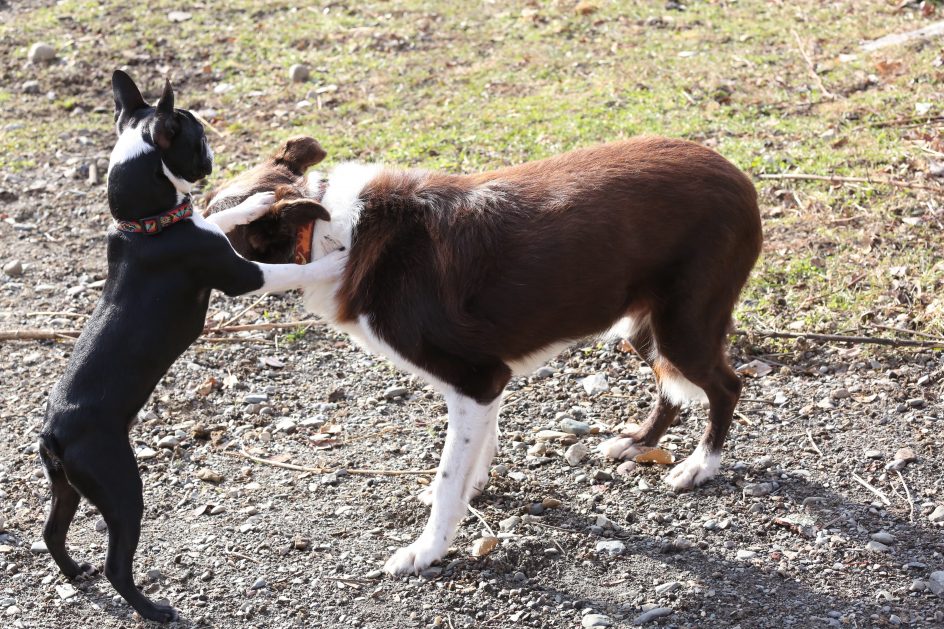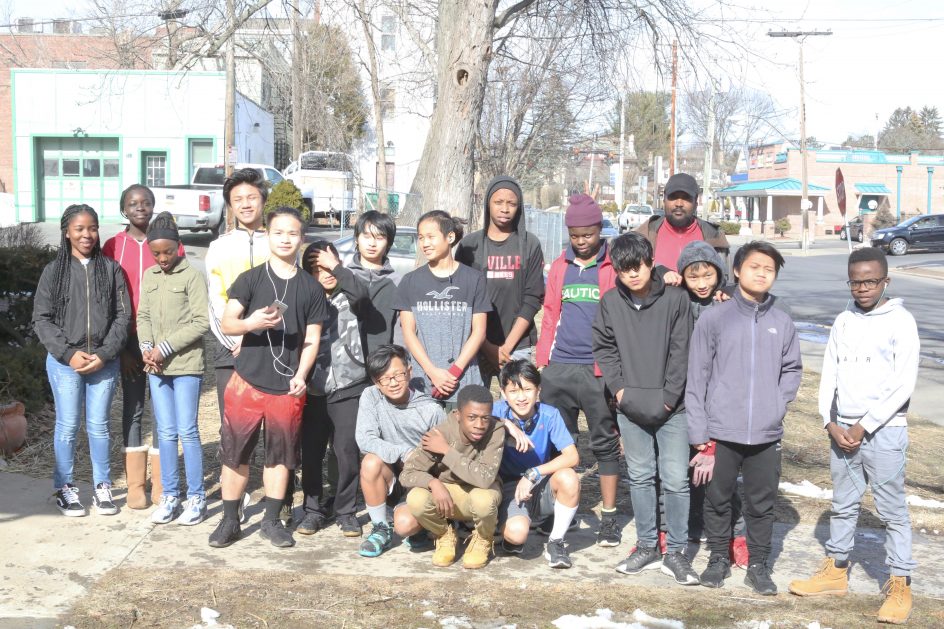
There is always pain and suffering in life, from growing up to growing old. We are only beginning to grasp the alienation and stress and rage created by a greedy, aspiritual culture dominated by a corporate and technological society whose values and institutions are in so many ways dehumanizing.
And just look at the news. We have been dehumanized.
From my perspective, we already ask too much of our pets and animals in demanding that they help us fill the needs which are not being met any longer by religion, politics, community, family, government or technology. People want their dogs to be therapists, best friends, spiritual advisers and mystics.
They can do a lot for us, but they aren’t built for that. I do understand the need.
I see evidence every day of the dehumanization all around me, from social media to cable news.
On Easter Sunday, while I was writing about Christ’s pleas to welcome the poor and vulnerable, our President was attacking and demonizing the poor and vulnerable on a Twitter feed. One is what we can be, the other reveals what we have become.
And many millions of my fellow citizens were cheering this cruelty on, like the Romans in the Colosseum roaring for the lions as they ate Christians. Our politics are a cesspool of argument and self-interest and corruption. Giant companies keep telling us how much they care about us, even as it becomes clearer every day that they don’t.
I see selfishness and cruelty all around me. My response is to be human.
The technology that Walt Disney celebrated in his movies as a miracle that brought electricity and heat and running water and washing machine’s to his family home now seems to disconnect and overwhelm us. Technical support is not support, and if you walk on any major American street, you will see people walking with their heads buried in cell phones, no longer seeing or talking to one another.
At night, we no longer go out to talk to our neighbors, we sit by our screens hoping for real community. It will never come from there.
Invasive and ubiquitous social media platforms leave so many glued to those screens for hours a day, ostensibly to share and connect, but increasingly, to divide and hate.
I know this subject well, for I was dehumanized over the course of my life. I lost faith and empathy and compassion, and failed to find a moral or meaningful purpose in life.
I worked hard to save myself, I got help and kept getting help until it helped.
But over time, I have come to see that it was animals that helped me to heal in the most measurable of ways, to re-humanize.
To remember what love was, to keep the flames of empathy and compassion alive.
To stand in the shoes (or paws) of other living things, to help fill the needs which were not being met in other, and perhaps better, ways, even though our society no longer sees its mission as meeting the needs of people.
There are twice as many poor people living in America today as there were the day Martin Luther King was killed. And the gap between the poor and the wealthy has never been wider, two subjects not even raised during all of the presidential debates combined in 2016.
In the early 1960’s, a psychologist named Boris Levinson wrote a ground-breaking book called Pets And Human Development, it is long out of print and almost completely forgotten. But he saw what was coming for people like me, and perhaps you, and he also foresaw the role animals might play in our efforts to recover and keep our sense of humanity.
“It would be better,” he wrote (this was in 1963), “if society were not so mechanized, routinized, and cut off from the vital rhythms of the natural world. But this is not the reality of life, at least in the Western world, and far-reaching improvements will be long in coming. In the meantime, animals can provide some relief, give much pleasure, and remind us of our origins.”
Animals are a double-edged sword. I see them as offering a path to people, but I know many people use them to hate people and disconnect from them. I was always clear about the animals I loved: they always brought me to people, they never took me away.
Levinson wrote about our growing estrangement from faith, from neighborhood and neighbors, from ancestors and community. “We despair because we cannot recognize the world of our childhood.” We feel powerless and estranged, he said, helpless to avert catastrophe, we are terrified of being alone when we confront it. And increasingly, we are alone when we confront it.
Much of the problem, he wrote, is that we are no longer connected to nature. Americans have fled the farms and crowd along our coasts. Rather than embrace nature, they destroy and displace it.
We fail to protect nature or animals and recognize them as our oldest friends and partners. Machines dominate our thinking, our life space, our hope and future. We are becoming slaves to them.
There is no public talk of a spiritual or moral life, it is not discussed on what our corporate masters like to call our “news.” And yet, one of the purest spiritual experiences of my life is walking through the woods with a dog. Or sitting quietly by the fire with one reading a book while they sleep.
Levin’s prediction came true for me, it was almost eerie. I was dehumanized, living in a castle with a moat, walled off from people and community. Animals were essential in my struggle to come back. He foresaw that as well.
As I felt myself becoming alienated and isolated, a fate that has befallen many others, I instinctively turned to the natural world and to animals to fill the needs I could not seem to meet in the outside world.
In desperation and some dread, I moved to the country, began to reconnect to nature. I walked every day, sat up on the mountains with my dogs and sheep, meditated in the woods, put my warm feet in cold streams.
I looked at beautiful things outside of every window, and I still do. I was – am – enveloped by the loving hands of the natural world. Every day, Maria and I listen to the brays of the donkeys and see the ancient sight of grazing sheep, and we give thanks for where we are. The animals are gifts to us even if they are far away.
I got a dog, a Lab named Lenore. I called her the Love Dog, and when there was nothing warm and loving in my life, I loved her. “Don’t you see?,” asked a wise therapist, “this is what you want from a human being.” Oh, I said.
Lenore kept love alive for me, and this was what i found in a human being.
I got a border collie named Rose, she gave me the strength and comfort to live on my farm alone for six years. In my mind, she was what made it possible for me to be there. “Don’t you see?,” I asked myself on a walk in the woods,”she is wonderful, but you can do this yourself.” And when she dies, I discovered that I could. Oh, I thought.
I came to live with a wild dog named Frieda, and I thought she could bring me to Maria, and help keep her with me. “Don’t you see?,” I told myself one day, Maria loves you for who you are, not for how you treat your dog. But the dog led me to her, a great act of loyalty and love.
Frieda gave me the strength to break through the walls around me, and open me up to the sometimes terrifying challenge of loving and being loved.
When I turned to hospice and therapy work with refugees, in part in a conscious effort to re-humanize myself, dogs made it possible. First Izzy and Lenore, then Red. These loving and gentle pets helped me to connect to other human beings in a way I could not do by myself, but which was very powerful. My dogs and I have sat by the bedsides of so many people at the edge of life.
This work changed my life.
Other animals entered my life to further open me up to humanity, not the machines that humans hid behind at night. Simon showed me the power of trust as he trusted me to heal him. Red opened so many doors for me. Gus opened me up like a can opener, as I wrote last week, as he slowly died in my arms. I am learning to acknowledge what I feel.
I use technology, but struggle with it, fight with it, always. I hope i never accept it, I hope it never becomes natural for me to talk to people in this disjoined and unsatisfying way.
The dogs were no panacea for my troubles. They are not a replacement for people. They cannot cure the troubles and ills of our culture. They can not make our leaders moral and compassionate. They cannot replicate the love of a human being. They cannot make us whole.
But as I look back, I see just how much Lenore and Izzy and Red and Simon and Gus did do for me.
The animals in my life reminded me of my essential connection to nature and the natural world.
They reminded me of my very origins. They made it possible for me to learn how to love. And they showed me how to empathize with other human beings.
They helped me to re-humanize myself, and I will not permit myself to forget those lessons or becoming dehumanized. Once this awakening comes, I don’t think its possible to go back.
As I meet and learn from other people, I see I am not alone in this. And I wonder every day, will animals help to save us, and keep alive the channels and feelings of genuine humanity? Can they remind of us of what pure love is, and of the joy and comfort that comes from loving and caring for another living thing?
Can they guide us to a celebration of Easter one day that is about loving our brothers and sisters, the needy, rather than fearing and assaulting them?
Many good people do not choose to live with or around animals, but there is a part of me that has hope for any person who can truly love an animal. Because I know that their humanity lives inside of them, not matter how angry or divisive or cruel they can be.
More than anything else, the animals I have lived with helped me to overcome my inability to come to terms with my self, especially my inner self, my soul, and to bring that soul into greater harmony with nature.
Science and religion and politics and technology have largely failed me.
The animals in my life never have.

